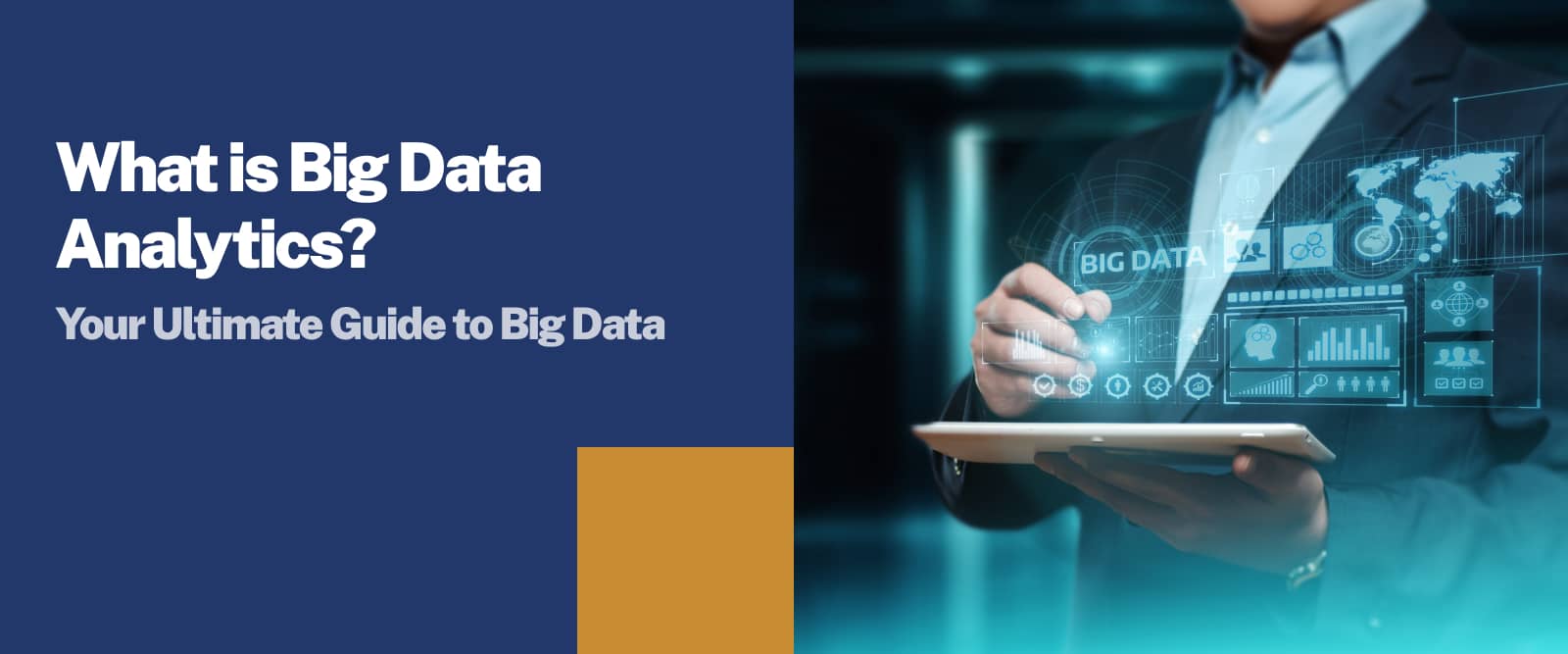5800 students unlocked their dream jobs with UG/PG programs in top colleges. Apply Now!
Data is the new gold, and harnessing the potential of valuable data takes a complex set of tools and skill sets. Big data analytics refers to the process of examining, cleaning, transforming, and modelling large and complex datasets to discover useful insights and support decision-making. It involves using advanced technologies such as machine learning, artificial intelligence, and statistical algorithms to process and analyse data from various sources to identify patterns and trends that can inform business strategies and improve outcomes. Students and professionals are becoming increasingly aware of the scope of Big Data, and the potential big data analytics holds as a career option.
Big data analytics has a vast and growing career scope, driven by the increasing demand for professionals who can handle and make sense of large amounts of data across sectors like marketing, finance, healthcare, and eCommerce. Demand for big data analytics professionals is expected to continue to increase as more organisations seek to leverage the power of data to drive their decision-making and improve outcomes. And this is the reason why many young students are opting for a bachelor of technology in Big Data Analytics.
Salaries for big data analytics professionals can be very competitive, and the field offers professional growth and advancement opportunities. So, if you want to pursue a B.Tech degree and learn big data analytics, read this blog. It will help you gather valuable big data analytics information.
[Also read: Why pursue an MBA after engineering?]
Why is Big Data Analytics Important
Over the years, big data analytics has grown by leaps and bounds due to its various applications. Big data analytics has proven itself as a critical tool for organisations that want to stay ahead in an increasingly data-driven world.
Take a look at the benefits of big data analytics implementation.
- Improved decision-making: Big data analytics provides organisations with valuable insights and information that can inform their decision-making, leading to better outcomes and improved results.
- Competitive advantage: By leveraging big data, organisations can gain a competitive advantage by making more informed decisions, identifying new business opportunities, and improving operational efficiency.
- Customer insights: Big data analytics gives organisations a deeper understanding of their customers, including their behaviour, preferences, and buying patterns. This information can be used to create more targeted marketing campaigns and improve customer satisfaction.
- Fraud detection and risk management: Big data analytics can detect fraud and manage risk by analysing large and complex datasets to identify patterns and anomalies that may indicate potential fraud.
- Improved operational efficiency: Big data analytics can be used to optimise business processes and improve operational efficiency by identifying bottlenecks, reducing waste, and streamlining operations.
The History of Big Data Analytics
The history of big data analytics can be traced back to the early 2000s when businesses first started to collect and store large amounts of data from various sources. At that time, traditional data processing and analysis methods were unable to keep up with the growing volume and complexity of data.
In response to this challenge, new technologies were developed to enable big data storage, processing, and analysis, including NoSQL databases, Hadoop, and Spark. These tools made it possible to analyse massive data sets in real-time, providing businesses with valuable insights that they could use to improve their operations and competitiveness.
Over the past decade, the concept of big data analytics has continued to evolve and mature, driven by advancements in technology and increasing demand from businesses. Today, big data analytics is widely used across many industries, including finance, healthcare, retail, and telecommunications, to drive strategic decision-making, improve customer experiences, and optimise operations.
Lifecycle of Big Data Analytics
The lifecycle phases of big data analytics typically include the following steps:
- Data Collection: The process of acquiring large amounts of data from various sources such as databases, social media, sensors, and other sources.
- Data Preparation: The cleaning, transforming, and organising of the collected data so it can be analysed.
- Data Storage: The process of storing the prepared data in a suitable format, such as Hadoop, NoSQL databases, or cloud storage.
- Data Processing: The process of analysing the data to identify patterns, trends, and insights using technologies such as Apache Spark, Hadoop MapReduce, and others.
- Data Visualization: The process of presenting the analysed data in a visual format, such as charts, graphs, and maps, to facilitate better understanding and decision-making.
- Data Insights and Decision Making: The process of using the analysed data to gain insights and make data-driven decisions.
- Data Maintenance and Updating: The process of updating and maintaining the data to ensure that it remains accurate and relevant.
Big Data Analytics Tools
- Apache Hadoop: An open-source software framework that enables the distributed processing of large datasets across a cluster of computers.
- Apache Spark: An open-source, distributed computing framework that is designed for fast processing of big data.
- NoSQL Databases: Databases that are designed to handle large amounts of unstructured data, such as MongoDB, Cassandra, and Couchbase.
- Apache Storm: An open-source, real-time processing system for big data.
- Apache Flink: An open-source, big data processing framework that provides a unified API for batch and real-time processing.
- Apache Hive: A data warehousing and SQL-like query language for Hadoop.
- Apache Pig: A high-level platform for creating MapReduce programs used with Hadoop.
- Tableau: A powerful data visualisation tool that helps organisations to visualise and interact with their data.
- Power BI: A business analytics service by Microsoft that provides interactive visualisations and business intelligence capabilities with an interface easy to use for end users.
- QlikView: An in-memory business intelligence platform that provides a unified view of an organisation's data.
How to Become a Big Data Analyst? - Eligibility and Admission Process
To pursue a B.Tech course in Big Data Analysis, students typically need to meet the following eligibility criteria:
- Complete your 10+2 or equivalent exam from a recognised board with physics, chemistry, and mathematics as core subjects. Some universities also require a minimum percentage in these subjects.
- You must secure at least 60% in aggregate score in your 10+2 or equivalent exam.
These above-mentioned points will determine your eligibility for application. The admission, however, will either be based on merit or entrance exams. Many universities accept national-level entrance scores or conduct their own exams for admission to B.Tech programs. Some of the popular entrance exams for a B.Tech degree include JEE Main, BITSAT, and VITEEE.
Here is the admission process for B.Tech in Big Data Analytics -
- First, meet the eligibility criteria for admission to the program (educational qualification, age limit, and entrance examination requirements).
- Merit-based admissions will assess your results and marks of class 12th.
- Entrance-based admissions will require you to clear national-level or university-level entrance exams and obtain the required cut-off marks.
Once you clear the admission requirement,
- Submit supporting documents such as transcripts, test scores, and other required materials.
- Attend interviews or group discussions
- Wait for the offer letter
- Accept the offer letter and pay the fees
Top Colleges for B.Tech in Big Data Analytics
|
Colleges |
Course Fee (₹) |
|
Coimbatore Institute of Technology |
87.5 K |
|
Miranda House, Delhi |
7.5 K |
|
The ICFAI University, Dehradun |
5.96 L |
|
Periyar University, Salem |
2 L |
|
Manipal Institute of Technology |
17.06 L |
|
Bharathiar University, Coimbatore |
11.7 K - 50.29 K |
|
Symbiosis Centre for Information Technology (SCIT), Pune |
10.8 L |
|
IIT (ISM) Dhanbad |
1.75 L |
|
Fore School of Management, Delhi |
1.25 L |
|
SASTRA (Deemed to be University), Thanjavur |
1.05 L-6.2 L |
Pursuing a Career in Big Data
A career in big data analytics is both promising and well paying. The demand for the skillset is going to increase by the day. After completing a B.Tech degree, one can get trained in big data analytics and assume one of the following lucrative job roles.
- Complete a B.Tech course: Getting a B.Tech degree can form a strong base for your big data analysis career. You can also pursue a B.Tech course in big data analytics.
- Familiarise yourself with the basics: Start by learning about the basics of big data, its concepts, and how it works.
- Get to know the technologies: Study the various technologies used to process and analyse big data, such as Hadoop, Spark, NoSQL databases, and others.
- Learn a programming language: Familiarise yourself with at least one programming language that is used for data analysis, such as Python or R. You can also learn some new technology trends.
- Study data visualisation: Visualisation is an important aspect of data analysis. Learn about various data visualisation tools and techniques.
- Practice: Get hands-on experience by working with real-world datasets and practising data analysis techniques.
- Read industry-related articles and reports: Stay up-to-date with the latest trends and advancements in big data analytics by reading industry-related articles and reports.
- Join online communities: Join online communities and forums where big data professionals and enthusiasts share their experiences and knowledge.
Big data analysts in India earn an average of ₹6.7 Lakhs per year. The range of salary can go from ₹2.7 Lakhs to ₹17.0 Lakhs per annum.
Conclusion
You will need basic mathematics and statistics knowledge to learn big data. While many colleges offer UG programs in Big Data Analytics, you can also learn it from other sources. In this regard, Sunstone can help you. It is a leading higher education service provider that offers industry-specific skills and training programs. Such training programs can help you become job-ready from day one.
FAQ - Big Data Analytics
Why big data analytics is important?
Businesses in modern days have become data-driven. Experts rely on large chunks of data to determine important business aspects like market sentiment, sales, performance, production, supply chain, and almost every other thing. Big data analysis can help professionals organise and analyse this data to steer the business to success.
HELP
Take the first step towards your dream job.
ABOUT THE AUTHOR


